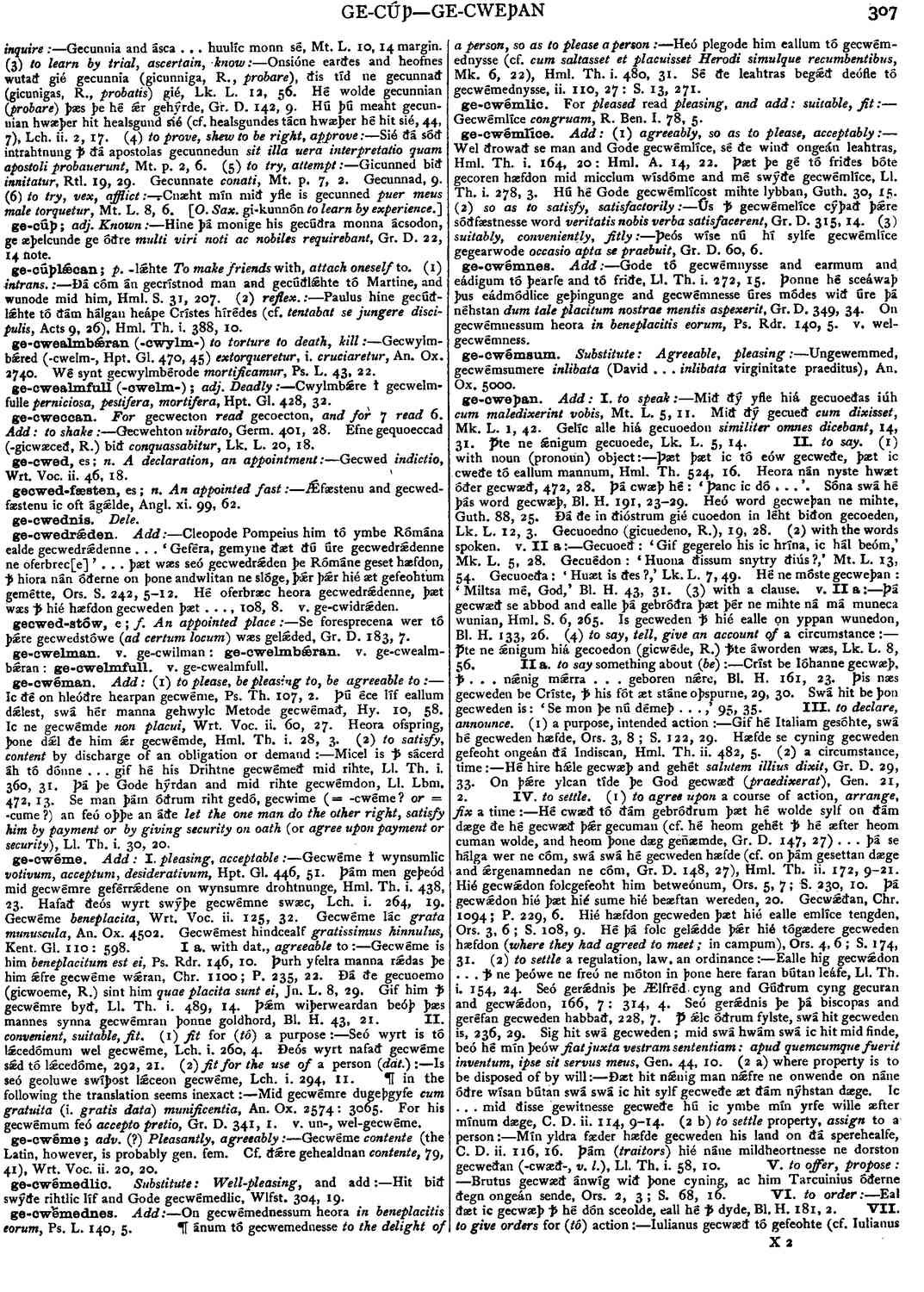ge-cweþan
-
Mið ðý yfle hiá gecuoeðas iúh
cum maledixerint vobis,
- Mt. L. 5, 11.
-
Mið ðý gecueð
cum dixisset,
- Mk. L. 1, 42.
-
Gelíc alle hiá gecuoedon
similiter omnes dicebant,
- 14, 31.
-
ꝥte ne ǽnigum gecuoede.
- Lk. L. 5, 14.
- Þæt þæt ic tó eów gecweðe, þæt ic cweðe tó eallum mannum. Hml. Th. 524, 16.
-
Heora nán nyste hwæt óðer gecwæð,
- 472, 28.
-
Þá cwæþ hé: 'þanc ic dó ...'. Sóna swá hé þás word gecwæþ,
- Bl. H. 191, 23-29.
-
Heó word gecweþan ne mihte,
- Guth. 88, 25.
-
Ðá ðe in ðióstrum gié cuoedon in léht biðon gecoeden,
- Lk. L. 12, 3.
-
Gecuoedno (gicuedeno,
- R.), 19, 28.
- Gecuoeð: 'Gif gegerelo his ic hrína, ic hál beóm,' Mk. L. 5, 28.
- Gecuédon: 'Huona ðissum snytry ðiús?,' Mt. L. 13, 54.
- Gecuoeða: 'Huæt is ðes?,' Lk. L. 7, 49.
-
Hé ne móste gecweþan: 'Miltsa mé,
- God,' Bl. H. 43, 31.
-
Þá gecwæð se abbod and ealle þá gebróðra þæt þér ne mihte ná má muneca wunian,
- Hml. S. 6, 265.
-
Is gecweden ꝥ hié ealle on yppan wunedon,
- Bl. H. 133, 26.
-
ꝥte ne ǽnigum hiá gecoedon (gicwéde, R.) ꝥte áworden wæs, Lk. L. 8, 56. II a.
to say something about (be )
:-- Críst be Ióhanne gecwæþ, ꝥ ... nǽnig mǽrra ... geboren nǽre,- Bl. H. 161, 23.
-
Þis næs gecweden be Críste, ꝥ his fót æt stáne oþspurne,
- 29, 30.
- Swá hit be þon gecweden is: 'Se mon þe nú démeþ ...,' 95, 35.
-
Gif hé Italiam gesóhte, swá hé gecweden hæfde. Ors. 3,
- 8; S. 122, 29.
-
Hæfde se cyning gecweden gefeoht ongeán ðá Indiscan,
- Hml, Th. ii. 482, 5.
-
Hé hire hǽle gecwæþ and gehét
salutem illius dixit,
- Gr. D. 29, 33.
-
On þǽre ylcan tíde þe God gecwæð (
praedixerat
),- Gen. 21, 2.
-
Hé cwæð tó ðám gebróðrum þæt hé wolde sylf on ðám dæge ðe hé gecwæð þǽr gecuman (cf. hé heom gehét ꝥ hé æfter heom cuman wolde, and heom þone dæg gensemde. Gr. D. 147, 27) ... þá se hálga wer ne cóm, swá swá hé gecweden hæfde (cf. on þám gesettan dæge and ǽrgenamnedan ne cóm,
- Gr. D. 148, 27), Hml. Th. ii. 172, 9-21.
-
Hié gecwǽdon folcgefeoht him betweónum,
- Ors. 5, 7; S. 230, 10.
- Þá gecwǽdon hié þæt hié sume hié beæftan wereden, 20.
-
Gecwǽðan,
- Chr. 1094; P. 229, 6.
-
Hié hæfdon gecweden þæt hié ealle emlíce tengden,
- Ors. 3, 6; S. 108, 9.
-
Hé þá folc gelǽdde þǽr hié tógædere gecweden hæfdon (
where they had agreed to meet;
in campum),- Ors. 4, 6; S. 174, 31.
-
Ealle hig gecwǽdon ... ꝥ ne þeówe ne freó ne móton in þone here faran bútan leáfe,
- Ll. Th. i. 154, 24.
-
Seó gerǽdnis þe Ælfréd cyng and Gúðrum cyng gecuran and gecwǽdon,
- 166, 7: 314, 4.
-
Seó gerǽdnis þe þá biscopas and geréfan gecweden habbað,
- 228, 7. ꝥ
-
Sig hit swá gecweden; mid swá hwám swá ic hit mid finde, beó hé mí þeów fiat juxta vestram sententiam: apud quemcumque fuerit inventum, ipse sit servus meus, Gen. 44, 10. (2 a) where property is to be disposed of by will :-- Ðæt hit nǽnig man nǽfre ne onwende on náne óðre wísan bútan swá swá ic hit sylf gecweðe æt ðám nýhstan dæge. Ic ... mid ðisse gewitnesse gecweðe hú ic ymbe mín yrfe wille æfter mínum dæge, C.D. ii. 114, 9-14. (2 b) to settle property,
assign
to a person :-- Mín yldra fæder hæfde gecweden his land on ðá sperehealfe,- C.D. ii. 116, 16.
-
Þám (
traitors) hié náne mildheortnesse ne dorston gecweðan (-cwæð-, v.l. ),
- Ll. Th. i. 58, 10.
-
Brutus gecwæð ánwíg wið þone cyning, ac him Tarcuinius óðerne ðegn ongeán sende,
- Ors. 2, 3; S. 68, 16.
-
Eal ðæt ic gecwæþ ꝥ hé dón sceolde, eall hé ꝥ dyde,
- Bl. H. 181, 2.
-
Iulianus gecwæð tó gefeohte (cf. Iulianusgegaderode his here. Hml. S. 31, 95),
- Hml. Th. ii. 502, 4.
-
Hé gecwæð tó gefeohte ongeán Arfaxað
pugnavit contra Arphaxad,
- Hml. A. 103, 26.
- Leódscipe Madian gecweden. Jud. 6, 1.
-
In þǽre stówe þe is gecueden Deórham,
- Chr. 577; P. 18, 31.
-
His tónama wæs Cambises gecweden,
- Hml. A. 103, 25.
-
His nama wæs gereht 'Godes strengo.' Wel þæt wæs gecweden,
- Bl. H. 9, 15.
-
ꝥ byþ rihtlíce gecweden gyldrǽdene, ꝥ we þus dón,
- Cht. Th. 607, 23.
-
Scilla ðet is sǽhund gecweden,
- An. Ox. 26, 61.
-
Þǽr wǽron háte baðu þe wǽron hálwende gecwedene ádligendum líchaman,
- Hml. Th. i. 86, 22.
-
Seó sáuwul oððe ꝥ líf oððe seó edwist synd gecwædene tó hyre sylfra, and ꝥ gemynd oððe ꝥ andgit oþþe seó wylla beóð gecwædene tó sumum þinga edlesendlíce,
- Hml. S. 1, 117.
-
Næs nánum men forgifen þæt hé móste habban oððe gecweðan his ágen fulluht búton Ióhanne ánum
nobody but John could say that his baptism was his own, could call his baptism his own,
- Hml. Th. ii. 48, 3.
Bosworth, Joseph. “ge-cweþan.” In An Anglo-Saxon Dictionary Online, edited by Thomas Northcote Toller, Christ Sean, and Ondřej Tichy. Prague: Faculty of Arts, Charles University, 2014. https://bosworthtoller.com/47555.
Checked: 0